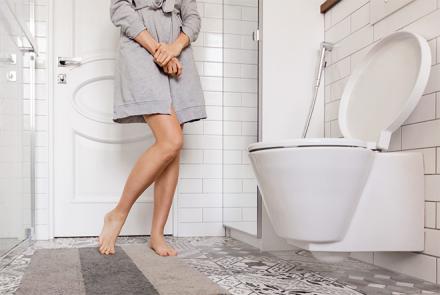
Aging is the most common cause of urinary issues in older adults, apart from Urinary Tract Infection, Urinary Incontinence and Chronic Kidney Disease. Read on to find out what steps can be taken to prevent or delay these issues which have a significant impact on quality of life.
Understanding Micturition (Urination)
Lots of nerves innervate the bladder. The feeling of bladder fullness travels up the spinal cord to the Micturition Center in the brain, which stimulates micturition through the nerve supply to the bladder. However, micturition is not always the same. The central nervous system determines the timing of micturition, in sync with the social and behavioral factors. Micturition is coordinated and initiated by the simultaneous actions of bladder contraction and relaxation of the urethral sphincters, again mediated by nerves. As the bladder fills, some nerves allow relaxation and distension of the bladder wall, while also causing contraction of the urethral sphincters. When the time is right for micturition, the other nerves activate the bladder, leading to contractions and relaxation of the urethral sphincters. During voiding, the activity of the urethral sphincters (valves at the base of the urethra) stops first, followed by an increase in muscle contraction and the flow of urine.
A person must have intact cognition to perceive the sensation of bladder fullness and the ability to delay micturition after the initial sensation. They also need motivation and desire to urinate, sufficient mobility and coordination to reach the toilet, and manual dexterity to manipulate clothing.
Most Common Causes of Urinary Issues in the Elderly
Aging and senescent changes in the body is inevitable. Understanding the common changes an issue as we age helps one to prepare for healthy aging and manage any issues better. As we age, we all witness changes in our health, including those related to the urinary system. Urinary issues in the elderly are common and can have a significant impact on the quality of life. The natural aging process coupled with the cumulative effects of other health conditions may cause urinary issues and hence it’s important to understand the same.
A: Urinary tract infections
-
There are caused when urine stays too long in the bladder.
-
The symptoms include:
- Pain or burning sensation during urination
- Increase in frequency of urination
- Foul-smelling, dark-colored, or cloudy urinary appearance
-
If the urinary infection spreads to the kidneys, symptoms may include:
- Pain in the groin, flanks, or lower back
- Chills with high fever
To read more about UTIs, go to https://www.patientsengage.com/condition/urinary-tract-infection
B: Issues due to aging:
- As we age, the amount of kidney tissue thins out (atrophy) and the kidney function also declines because the filtration units (nephrons) also decrease.
- With aging, the blood vessels supplying the kidneys also may stiffen, as happens with all other blood vessels and that may cause the filtration process from the kidney to slow down.
- The bladder wall, too, becomes stiffer, loses its elasticity, and weakens. Therefore, the capacity of the bladder to hold urine declines.
- Sometimes the urethra may be partially or completely blocked. The primary cause in women is due to weakened pelvic floor muscles that cause laxity of the bladder or vagina (prolapse). In men, the enlarged prostate gland may cause the blockage of the urethra.
- In men, the prostate gland enlarges and may press on the urethra, leading to bladder obstruction and urinary flow issues.
- In women, the pelvic tissue may lose its tone and cause the uterus and bladder to prolapse, which may cause incontinence. Also, menopausal changes may cause dryness of vagina and irritation and thinning of the bladder wall.
C: Urinary incontinence
Urinary incontinence in the simplest terms means the loss of the ability to control the bladder. It is widely prevalent among older individuals; it should not be considered a natural consequence of aging. The aging process leads to a decrease in bladder capacity, a decline in the ability to delay urination, an increase in involuntary bladder contractions, and a weakening of bladder contractions. Usually, a combination of behavioral interventions like those mentioned below may be helpful in managing the condition.
Learn about managing Urinary Incontinence : https://www.patientsengage.com/condition/urinary-incontinence
D: Chronic kidney disease
- The kidneys are a pair of organs, each approximately the size of the fist. Each kidney comprises approximately one million tiny structures known as nephrons that are responsible for filtering the blood.
- The primary function of the kidneys is to eliminate toxic wastes and excess water from the body. They also maintain the balance of essential salts and minerals in the blood and release the hormones that help in controlling our blood pressure, managing anemia (low hemoglobin), and maintaining strong bones. All the waste and excess water that is filtered by the kidneys is eliminated as urine which is temporarily stored in the urinary bladder.
- If the kidneys are damaged, they cannot perform the filtration of blood which can lead to the accumulation of toxic waste products in the body, along with compromise of other functions like maintaining the hemoglobin, bone health and blood pressure that can be detrimental to our health. Some causes that lead to the damage of the kidneys are diabetes, high blood pressure, heart (cardiovascular) disease, smoking, abnormal kidney structure (Anatomical defects) etc.
- Uncontrolled kidney issues may lead to kidney failure and dependence on dialysis.
For further information about Chronic Kidney Disease go to https://www.patientsengage.com/condition/chronic-kidney-disease
What happens if these issues are left undiagnosed or untreated ?
Kidneys are a vital organ of the body that does not regenerate and therefore, once the function is lost it cannot be restored. We can only attempt to prevent further damage. Longstanding kidney and bladder issues like incontinence, urinary infections may lead to malfunctioning and permanent damage of the kidneys. Comorbidities like diabetes may also lead to damage to the kidneys if not managed and monitored regularly.
It is imperative to be aware of the conditions that affect the urinary bladder and kidneys with age to identify the red flags.
Some symptoms that should encourage you to see your doctor are:
- Change in color of urine: cloudy or pale urine
- Foul smell in urine
- Blood in urine
- Nocturia
- Frequent urinary infections
- Change in flow or stream of urine
- Leakage of urine
- Pain during urination
- Unaccounted weight loss
- Raised blood pressure
- Uncontrolled diabetes
Things one can do to maintain Bladder and Kidney Health
- As we know by now that kidneys are the filtration units of the body and help to flush out all toxins and waste from the body while the bladder helps to store and evacuate the wastes out of the body, they are both vital to maintain health and survival of a person.
- Unaddressed issues like bladder and kidney infections, unmanaged diseases like diabetes and hypertension may lead to kidney failure and dependence on dialysis for survival. That is not only uncomfortable but an expensive process with many side effects of its own.
- Sometimes issues like incontinence may cause physical dependance and embarrassment to a person. It may need to isolation and depression if unaddressed.
Related Information: Managing Bowel and Bladder Incontinence in Cancer Patients
Behavioral changes:
- Maintaining a bladder diary which should include information about the timing of voiding, amount of urine voided, types of fluids consumed if the person managed to reach the toilet on time.
- Build a schedule for voiding at fixed interval.
- Frequent prompts to encourage voiding help to reduce episodes of incontinence
Bladder training
- It is particularly helpful in patients who struggle with urinary urgency and increased frequency of urination.
- It involves strengthening the pelvic floor muscles by contraction, relaxation techniques.
- It also includes distraction to help in delay voiding and thus increasing the time interval between voiding.
Pelvic floor/Kegel’s exercises:
- It is useful for people struggling with stress, urge or mixed incontinence.
Lifestyle modification
- This involves the modification of the amount of fluid intake, timing of fluid consumption, and the types of fluid.
- While a large intake of fluid can lead to a sudden bladder fullness, incontinence and nocturia, too much of fluid restriction may increase the chances of dehydration.
- Fluids containing caffeine act as a diuretic and irritate the bladder, which may cause an increase in the bladder pressure.
- Losing weight may help, as obesity is associated with an increased risk of urinary incontinence. An increase in intra-abdominal visceral fat (fat deposited over the internal organs) may weaken the pelvic floor muscle support.
Manage your comorbidities:
- Be in touch with your doctor to mange other existing issues like hypertension and diabetes to maintain the function of the kidneys.
Get regular health checks:
- Getting regular health check helps in identifying any changes in the kidney function and or urinary issues like infections and can be helpful in maintaining the function and health of bladder and kidneys.
- Regular health checks are also helpful in identifying and managing comorbidities that affect the kidney function.
REFERENCES:
- Lim, Si Ching, and Si Ching Lim. “Managing the Elderly with Urinary Incontinence and Dementia.” Clinmedjournals.org, vol. 3, no. 2, 5 June 2017, clinmedjournals.org/articles/iauc/international-archives-of-urology-and-complications-iauc-3-027.php?jid=iauc.
- Shah, Darshan, and Gopal Badlani. “Treatment of Overactive Bladder and Incontinence in the Elderly.” Reviews in Urology, vol. 4 Suppl 4, no. Suppl 4, 2002, pp. S38-43, www.ncbi.nlm.nih.gov/pmc/articles/PMC1476020/.
- Mayo Clinic. “Urinary Tract Infection (UTI) - Diagnosis and Treatment - Mayo Clinic.” Mayoclinic.org, 14 Sept. 2022, www.mayoclinic.org/diseases-conditions/urinary-tract-infection/diagnosi….
- “Urinary Incontinence Treatment & Management: Approach Considerations, Absorbent Products, Urethral Occlusion.” EMedicine, 17 Aug. 2023, emedicine.medscape.com/article/452289-treatment?form=fpf.
- “Chronic Kidney Disease - Kidney and Urinary Tract Disorders.” MSD Manual Consumer Version, www.msdmanuals.com/en-in/home/kidney-and-urinary-tract-disorders/kidney…. Accessed 13 Dec. 2023.
- “Chronic Kidney Disease.” Www.hopkinsmedicine.org, www.hopkinsmedicine.org/health/conditions-and-diseases/chronic-kidney-d…














